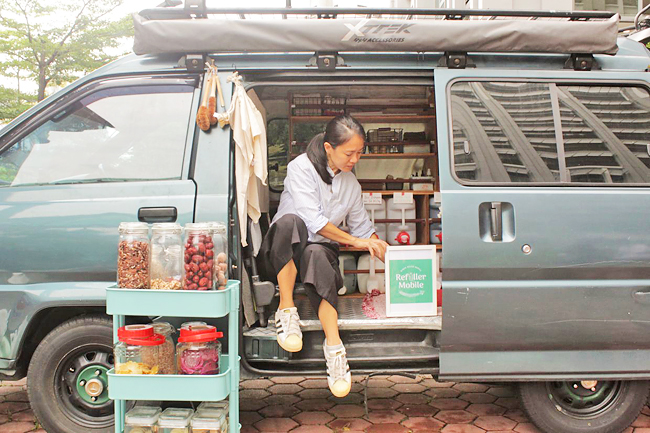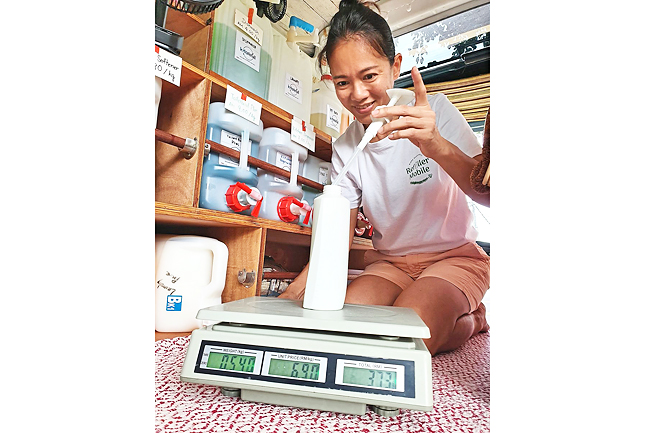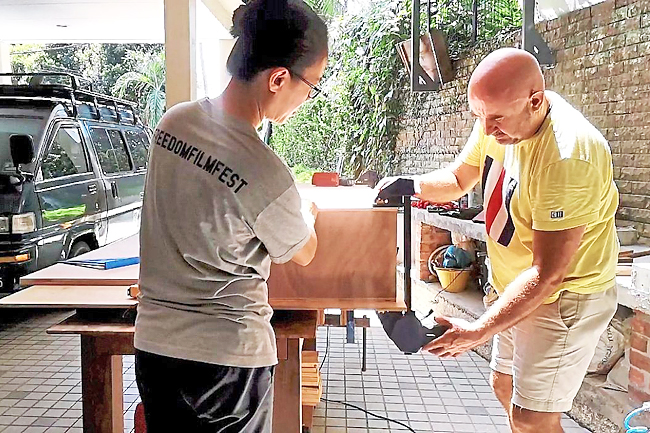ANN/THE STAR – In her peacock blue Nissan van that’s been kitted out to be a zero-waste mobile “shop”, Oh Sok Peng hopes to drive the message of sustainability to Malaysians of all walks of life.
Oh cares about the environment and she’s passionate about sharing why living a zero-waste life is a sensible choice – not just for the environment; it also makes economic sense.
Last June, Oh launched Refiller Mobile – her mobile zero-waste refillery that sells household cleaning agents, dried food and personal care products and such to consumers.
She drives around the Klang Valley, Malaysia in her van that’s always well stocked (and tightly packed) with these household products which consumers fill into their own containers.
People can buy as much, or as little, of the products as they want as the refillables are sold by weight.
The former documentary film distribution manager said that she’s on a mission to encourage more people to adopt simple zero-waste habits, such as refilling bulk food items and cleaning products in reusable containers from home instead of buying new off-the-shelf products each time.
The aim is to reduce plastic waste as much as possible. Oh said that she’s slowly seeing the rewards of her labour of love.
“In the last six months alone I have refilled thousands of plastic bottles and managed to save over 30,000 one-litre bottles. The number may look small but the more families adopt this concept, it will make a significant impact on the environment,” said Oh who lives in Petaling Jaya.



Oh’s zero-waste concept isn’t new and there are quite a few zero-waste stores across the Klang Valley. But what is unique is her zero waste shop-on-wheels concept that brings convenience to the equation. She wants to make zero-waste shopping easy for Malaysians.
“The response has been overwhelming from different communities in the Klang Valley. People have heard about Refill Mobile and they are curious about the business.
“Besides neighbourhoods in Petaling Jaya and Kuala Lumpur, I’ve been to places like Putra Heights and Rawang. Communities in smaller areas are happy to welcome Refiller Mobile because it saves them a trip to the city to buy zero-waste products.”
It’s cost-effective
Oh was inspired to adopt a zero-waste lifestyle four years ago. The former documentary film distributor said that initially her motivation was personal: To “save money and reduce plastic wastage”.
“In my previous job, I used to travel abroad regularly. I would stay in different hotels and I remember how much waste I produced, throwing away single-use hotel slippers, personal care bottles, wrappers and such. Slowly, I began to reflect on my carbon footprint and the amount of waste I was producing,” she said.
Not long after, she started her green journey and began shopping for personal and home care products at zero-waste stores in Petaling Jaya.
“There’s a common misconception that zero waste products are expensive. But these products aren’t pricey because you are actually buying in bulk. Instead of paying for packaging and branding, you’re just paying for the product. It’s so much cheaper.
“For example, a two-kilogramme refill of shower gel costs about RM19.20 and it can last for months. The products are effective as commercial brands. I’ve tried them for four years now and I’m confident they work as well as commercial brands.
“Plus, it’s eco-friendly… so why not?” said Oh. Since then, she’s learnt more about zero-waste and sustainable practices – lessons that she wants to share with others.
“I want to educate people on reducing waste. Refilling will allow you to buy things package-free, without the packaging cost and branding. It is actually a more economical option,” Oh shared.
“We have been taught that recycling is the solution and this encourages us to produce more waste and buy more plastic bottles without guilt,” said Oh. “However, not all bottles are recyclable,” she points out.
According to Solid Waste Management and Public Cleansing Corporation (SWCorp), only 0.06 per cent of waste in Malaysia is recycled – the rest ends up in landfills.
Malaysia generates nearly 38,427 metric tonnes of waste each day of which, 82.5 per cent is disposed in landfills, according to Waste To Energy For A Sustainable Future, an article on the Malaysian Investment Development Authority website. The amount of municipal solid waste collected – about 14 million metric tonnes per annum – is enough to fill Kuala Lumpur’s Petronas Twin Towers every seven days, the article revealed. “The biggest concern is when non-recyclable plastic turns into micro-plastic and goes into the ocean and our food. So, why not refill?” said Oh.
The eco-warrior
Oh quit her job as a film distributor in September 2021 as she wanted a break from her demanding job. It was right smack during the pandemic, and she decided to spend her time doing community service instead.
She’d worked as a producer and documentary distribution manager (specialising in films, European documentaries for terrestrial TV, OTT (over the top) media streaming services and theatrical releases in Asia) for close to two decades prior to quitting.
She signed up as a volunteer at the COVID-19 Vaccination Centre in Petaling Jaya, and at non-profit organisation Zero Waste Malaysia (ZWM). Her stint at ZWM changed her perspective on life and exposed her to environmental issues.
“I was involved in ZWM’s Thrashpedia, a one-click platform that aims to educate Malaysians about waste segregation while offering zero-waste alternatives. Through my involvement with ZWM, my thoughts on sustainability changed.
“I didn’t see the need for material things and felt contented with the simple things in life. I felt happy to reach out to others and educate them on the importance of the 3Rs. And that inspired me to launch Refiller Mobile,” she said.
Oh reveals that her parents initially didn’t know that she had started her zero-waste business.
“You can imagine their surprise after they found out about Refiller Mobile. My parents run a food business and their biggest concern was whether I would be able to sustain my eco-friendly business. They worried if I could earn a living (doing this). Thankfully, their perception changed after seeing stories about my cause on social media and in the news,” explained Oh, who has three brothers.
Oh said that she isn’t interested in “climbing the corporate ladder or raking in big bucks” but is pursuing her belief.
“With Refiller Mobile, I cannot earn the salary that I used to make. But I’m at a stage where I am standing up for my beliefs. I don’t have the ‘fire’ to climb up the corporate ladder anymore. And I don’t have the drive to go after bigger paycheques. “I feel content running my own business and there’s nothing more fulfilling than educating people on the importance of caring for Mother Earth,” said Oh.
Customising her van
Oh purchased her 28-year-old van from a couple who had used the vehicle as a camper van. She had to transform it into a refiller van, complete with bars and compartments for her products. Thankfully she was introduced to Rich Samuel, a British-born but KL-based carpenter who pimped out her second-hand van into the mobile shop it is today.
Oh’s van is neatly packed with the refillable products she sells. The items are neatly arranged in large glass jars and 10-litre rectangular containers. Laundry detergent, dishwashing liquid, floor cleaners and shower gels are sourced from Kita Refill, a PJ-based detergent bulk store.
“The household cleaning agents that we carry in Refiller Mobile are eco-friendly, kinder to the environment and gentler to our skin. They are as effective, if not better, than the commercial ones as our products are produced locally and without sodium laureth sulfate, parabens and other nasties. They will not clog our waterways or irritate our skin. They are also biodegradable,” she explained.



















































